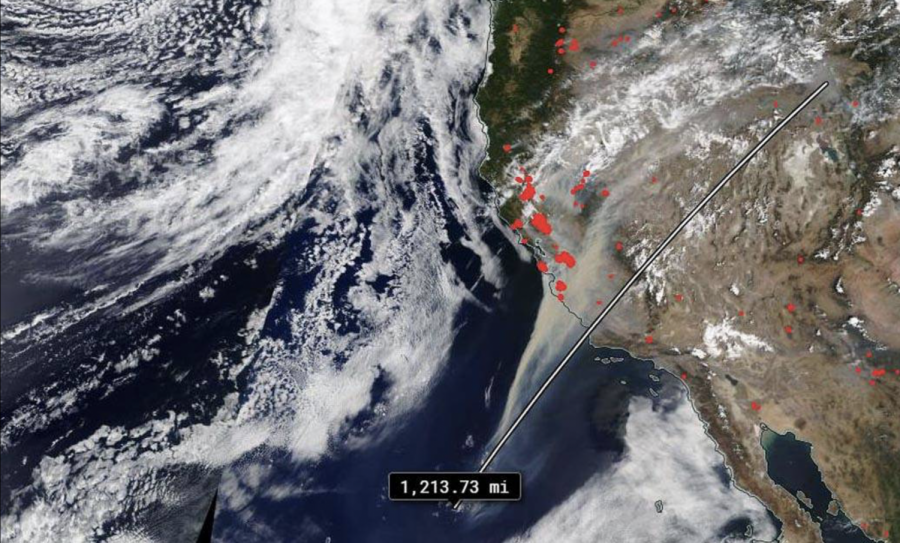Let’s address climate change
Examining recent effects of climate change from Earth Overshoot Day to California’s current condition
Photo by Neysa Singh | Used w perm
This image from NASA’s terra satellite was able to capture the huge swath of smoke generated by the California wildfires.
September 11, 2020
On Aug. 22, our planet hit Earth Overshoot Day — the term signaling that humanity has exhausted nature’s resources for the year. To calculate when this day falls, scientists took into account changes in carbon emissions, food demand, forest harvest and any other factors that impact our ecological footprint.
In 2019, the world reached this day on July 29, which is the earliest ever recorded. However, reaching Earth Overshoot Day more than three weeks later this year is hardly due to intentional change. This is a direct result of the COVID-19 lockdowns around the world — while quarantined, people around the globe have traveled less, stayed indoors and been more mindful of their purchases. Additionally, the pandemic improved several global issues, including reducing overconsumption, carbon emissions, population growth and water consumption.
At the rate we are currently consuming resources, humanity uses 60% more than what can be renewed in a year. From Earth Overshoot Day until the end of the year, the ecological deficit that our planet fell into in the 1970s continues to grow.
In early August, lighting storms, which are rare in California, combined with heat waves, sparked major wildfires across the state. Since the late 1900s, the intensity and frequency of wildfires in California have significantly increased. This unnatural weather was a direct cause of climate change, and now large wildfires continue to burn down acres of land throughout California despite firefighters’ best efforts. Aside from the many people who have lost their homes and belongings to the fires, the wildfires have severe ecological effects, such as limiting the ability of an ecosystem to recover. This can potentially cause permanent loss of the native vegetation and expansion of invasive species. These effects have highlighted the need for California to increase its wildfire risk management and direct a greater effort towards preventing future fires.
The wildfires are a case study on how climate change is getting worse, and our inaction is simply exacerbating the problem. The way we are using the earth is unsustainable and extremely detrimental to the environment, and as members of our community, it is our responsibility to take action and advocate for the conservation and preservation of our resources.
A way that we can do this is on a local, statewide or national scale, when we have the opportunity to vote, is to vote for candidates whose platforms include climate change policies. Additionally, to reduce your ecological footprint, we can power our homes with renewable energy, reduce water waste, drive fuel efficient vehicles, recycle, conserve water and much more.
There are many ways to protect the environment from your house, that require little effort but go a long way. We only have one earth, and it is our job to protect it.


















